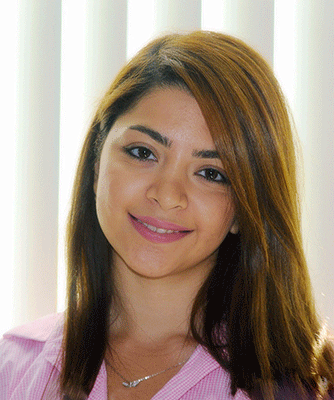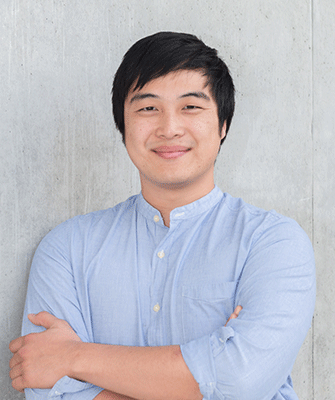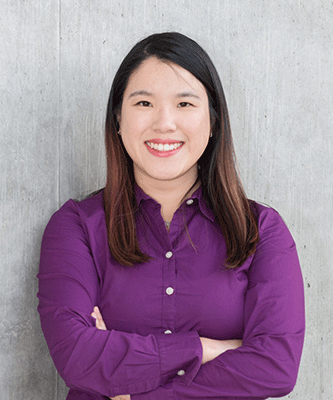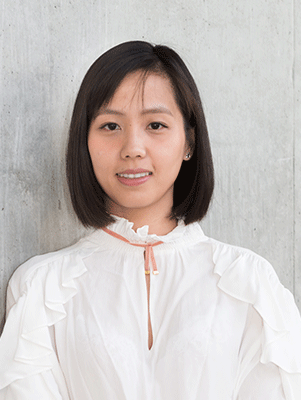Graduate Students Named 2018 Public Impact Fellows
 Jan. 18, 2018 - Biomedical engineering graduate student Rachel Gurlin is one of four UC Irvine students named Public Impact Distinguished Fellows this year by the UCI Department of Graduate Studies. The Public Impact Distinguished Fellowships support doctoral or MFA students whose current research has the potential to significantly improve or enrich the local, national or global community.
Jan. 18, 2018 - Biomedical engineering graduate student Rachel Gurlin is one of four UC Irvine students named Public Impact Distinguished Fellows this year by the UCI Department of Graduate Studies. The Public Impact Distinguished Fellowships support doctoral or MFA students whose current research has the potential to significantly improve or enrich the local, national or global community.
Gurlin, who expects to receive her doctorate next year, earned her bachelor’s degree at UC Davis. She works in the lab of biomedical engineering professor Elliot Botvinick, where she uses tissue engineering and microfabrication techniques to develop a skin-integrated bioartificial pancreas device for the treatment of Type 1 diabetes.
Gurlin, who will receive a $12,000 Public Impact Fellowship stipend, also has compiled several other awards to support her research. The recipient of a T32 CARE (Cardiovascular Applied Research and Entrepreneurship) Fellowship, an ARCS Scholar Award, a Mazda Foundation Scholarship, and the 2015 Business Plan School of Medicine Award, she also serves as president of the Graduate Association of Biomedical Engineering Students.
After her sister was diagnosed with Type 1 diabetes at age 10, Gurlin made it her personal goal to engineer better treatments for diabetics. “This Public Impact Fellowship will certainly aid me in this goal, specifically to benefit people like my sister…. This fellowship is an honor to receive and I am grateful for the opportunity to share my research with others,” she said. “The Public Impact Fellowship reinforces my desire to continue my work and will ensure my success in bringing my technologies to patient hands.”
In addition to the four Distinguished Fellowships, the Department of Graduate Studies awards 10 Public Impact Fellowships, carrying a $1,000 stipend, each year. This year, Samueli School students won four of those awards.
Arghavan Arafati, a mechanical and aerospace engineering doctoral candidate, works with Arash Kheradvar, professor of biomedical engineering, to develop cardiac imaging and diagnostics tools that leverage artificial intelligence and big data. Specifically, she is developing a novel platform to automate the cardiac image analysis process in order to eliminate human error in diagnosing cardiovascular disease.
“This fellowship serves as an inspiration and encouragement for me to follow my dreams of improving the lives of Americans and people all around the globe,” Arafati said.
Biomedical engineering doctoral candidate Michael Chu’s research interest is mobile health monitoring, specifically developing and applying wearable health systems for disease detection. His current work focuses on creating sensors to measure the respiratory health of asthmatic patients. His graduate adviser is biomedical engineering professor Michelle Khine.
 “Asthma is the leading chronic illness in children. Within California, it is estimated that over 600,000 children have asthma,” Chu said. “My current research … will not only help reduce complications, but will also give parents peace of mind knowing that they can continuously and remotely monitor their children’s health.”
“Asthma is the leading chronic illness in children. Within California, it is estimated that over 600,000 children have asthma,” Chu said. “My current research … will not only help reduce complications, but will also give parents peace of mind knowing that they can continuously and remotely monitor their children’s health.”
Lancy Lin, a biomedical engineering doctoral candidate who also works in Khine’s lab, is developing point-of-care (POC) and wearable health-monitoring methods to detect and manage congestive heart failure and other chronic or infectious conditions. Currently she researches low-cost platforms that can continuously monitor symptoms and severity of heart failure.
“I envision this monitoring system to be as simple as wearing a band-aid-like smart skin patch that passively monitors vital signs day-and-night and alerts the individual if they need to seek medical attention,” she said. “A more comprehensive and convenient monitoring motif will help high-risk individuals detect disease onset and current patients with more effective disease monitoring. The low-cost factor will facilitate accessibility and affordability across social-economic backgrounds. Ultimately, this research will improve mortality rates and help individuals retain their quality of life.”
Jie Zheng, another biomedical engineering doctoral candidate, works in the lab of neurology professor Jack Lin. Using intracranial electrode recordings, she studies the neural dynamics underlying emotional memory processing. She also attempts to improve memory and neuropsychiatric therapies using brain stimulation. She frequently presents her work at international neuroscience conferences and was named one of 10 Graduate Student Award winners at a recent Cognitive Neuroscience Society meeting.
 “Approximately one in 20 California adults suffers from a serious mental disorder, with an even higher rate in children,” Zheng said. “Our findings highlight the potential of a circuit-specific and personalized neuropsychiatric therapy using brain stimulation approaches. This research, synergizing neuroscience and psychiatry, provides hope for improved mental health care.
“Approximately one in 20 California adults suffers from a serious mental disorder, with an even higher rate in children,” Zheng said. “Our findings highlight the potential of a circuit-specific and personalized neuropsychiatric therapy using brain stimulation approaches. This research, synergizing neuroscience and psychiatry, provides hope for improved mental health care.
“Receiving this award motivates me to convey my work to an even broader public, and in doing so, hopefully inspires more people to study our mysterious brains.”
-Anna Lynn Spitzer
